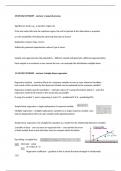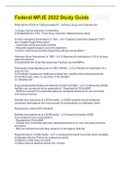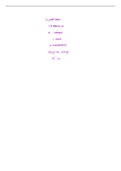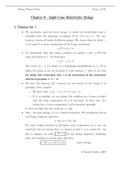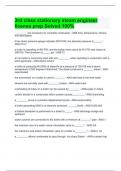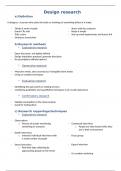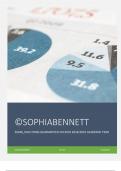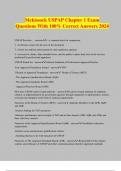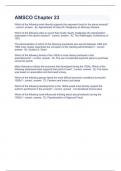29/09/2021 PY2RMP – Lecture 1 research process
Significance levels e.g., a rejection region (α)
If the test value falls into the rejection region, the null is rejected & the alternative is accepted
p is the probability of finding the observed data due to chance
Replication reduces Type I errors
Sufficiently powered experiments reduces Type II errors
Sample only approximates the population – different sample will generate a different approximation
Each sample is an estimate as two cannot be true- can resample the distribution multiple times
11/10/2021 PY2RMP – Lecture 2 simple linear regression
Regression analysis – examine effects of a response variable on one or more observed variables –
how much of the variation by the observed variable can be explained by the response variable?
Regression models used for prediction – estimate values of Y using information about X – want the
regression model to fit closest to the actual data as possible
If using X to predict Y, you’re regressing Y onto X (Y = predicted/IV & X = predicting/DV)
Simple linear regression = single explanatory & response variable
Multiple regression = multiple explanatory variables on a single response variable (can
look at independent effect of each variable while adjusting others)
Simple linear regression: the straight line equation as a model for the relationship between variables
2 models of data – can use mean or regression line – can examine the error
of both models (how much data they miss) to compare which fits better
Describing a straight line:
Intercept – value
of Y when X = 0
Regression coefficient – gradient of line to show direction/strength of relationship
, Error term – tells us how far off the model was (don’t have to include in equation)
Calculating regression model – method of least squares & line of best fit
Method of least squares – minimises errors in the model (sum of squared error - how far the model
is from each data point)
Line of best fit – determine if it is actually ‘best’ for data as it is affected by outliers
How much of the original error estimation is eliminated by using the regression model vs the mean
SS Total – SS Residual = SS Explained = R 2
R2 = % product of variation accounted for by other potential predictors & chance
R2 measures the success of the regression model & indicates how much better DV can be predicted
from information about the observed values rather than just the DV mean
√2 R 2 = Pearson’s R correlation
Total variability – SST - deviation of individual data from Grand mean
Regression sums of squares – SSR – deviation of mean on Y from regression on model
Residual sums of squares – SSR – deviation of data from regression model
Residuals > 3 = outliers
If the regression model is a better predictor than the mean, expect SS M
(improvements due to model) to be greater than SS R (error in model)
= Pearson’s Correlation Coefficient squared when there is 2 variables
= Mean squares (averages) is linked to the ANOVA test
ANOVA test – tells us if overall model is highly significant/better than chance to predict variables
18/10/2021 PY2RMP – Lecture 3 multiple regression
Linear regression – approximating data as a straight line when the data is directly linked (assume y is
dependent on x)
Multiple linear regression – predicting the value of an outcome based on several predictors while
controlling other variables
ANOVA – test of variance & measure of how significant the regression model is as a better fit
compared to just using the mean to predict the value of the outcome
Significance levels e.g., a rejection region (α)
If the test value falls into the rejection region, the null is rejected & the alternative is accepted
p is the probability of finding the observed data due to chance
Replication reduces Type I errors
Sufficiently powered experiments reduces Type II errors
Sample only approximates the population – different sample will generate a different approximation
Each sample is an estimate as two cannot be true- can resample the distribution multiple times
11/10/2021 PY2RMP – Lecture 2 simple linear regression
Regression analysis – examine effects of a response variable on one or more observed variables –
how much of the variation by the observed variable can be explained by the response variable?
Regression models used for prediction – estimate values of Y using information about X – want the
regression model to fit closest to the actual data as possible
If using X to predict Y, you’re regressing Y onto X (Y = predicted/IV & X = predicting/DV)
Simple linear regression = single explanatory & response variable
Multiple regression = multiple explanatory variables on a single response variable (can
look at independent effect of each variable while adjusting others)
Simple linear regression: the straight line equation as a model for the relationship between variables
2 models of data – can use mean or regression line – can examine the error
of both models (how much data they miss) to compare which fits better
Describing a straight line:
Intercept – value
of Y when X = 0
Regression coefficient – gradient of line to show direction/strength of relationship
, Error term – tells us how far off the model was (don’t have to include in equation)
Calculating regression model – method of least squares & line of best fit
Method of least squares – minimises errors in the model (sum of squared error - how far the model
is from each data point)
Line of best fit – determine if it is actually ‘best’ for data as it is affected by outliers
How much of the original error estimation is eliminated by using the regression model vs the mean
SS Total – SS Residual = SS Explained = R 2
R2 = % product of variation accounted for by other potential predictors & chance
R2 measures the success of the regression model & indicates how much better DV can be predicted
from information about the observed values rather than just the DV mean
√2 R 2 = Pearson’s R correlation
Total variability – SST - deviation of individual data from Grand mean
Regression sums of squares – SSR – deviation of mean on Y from regression on model
Residual sums of squares – SSR – deviation of data from regression model
Residuals > 3 = outliers
If the regression model is a better predictor than the mean, expect SS M
(improvements due to model) to be greater than SS R (error in model)
= Pearson’s Correlation Coefficient squared when there is 2 variables
= Mean squares (averages) is linked to the ANOVA test
ANOVA test – tells us if overall model is highly significant/better than chance to predict variables
18/10/2021 PY2RMP – Lecture 3 multiple regression
Linear regression – approximating data as a straight line when the data is directly linked (assume y is
dependent on x)
Multiple linear regression – predicting the value of an outcome based on several predictors while
controlling other variables
ANOVA – test of variance & measure of how significant the regression model is as a better fit
compared to just using the mean to predict the value of the outcome

